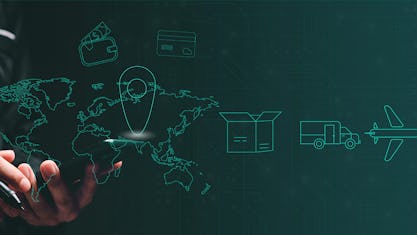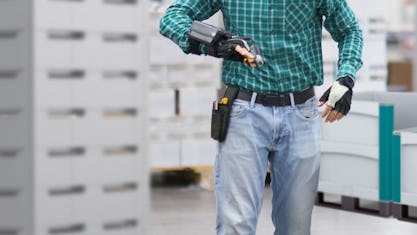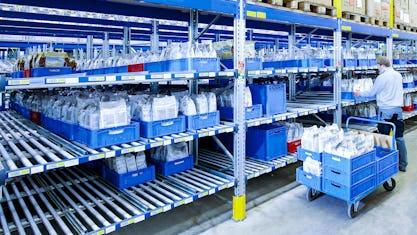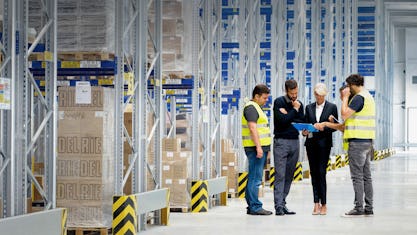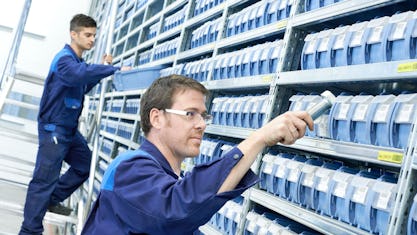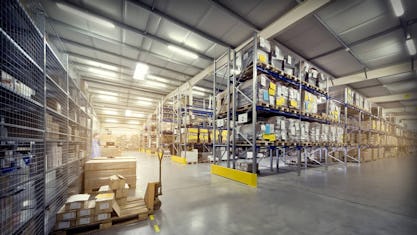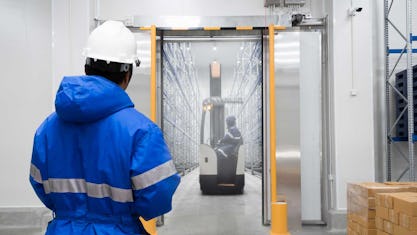Blockchain in logistics
New blockchain solutions are developed almost daily. Small and medium-sized enterprises (SMEs) in particular should not miss the boat. The good news is that there are many ways to get started with this promising technology.
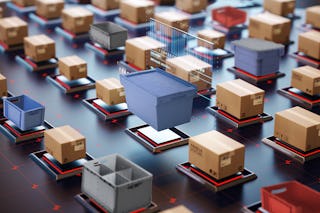
Maybe we are on the verge of a new revolution - the Blockchain Revolution! This depends on whether the blockchain technology and its advantages will actually find their way into everyday business life. Logistics (especially supply chains) seems to be an excellent choice for block chains. Why this is so, you will understand much better after the following short introduction.
How does Blockchain technology work?
The blockchain technology goes back to the development of the crypto currency Bitcoin. A hacker named Satoshi Nakamoto, whose identity has yet to be clarified, solved a fundamental problem for the security of the Blockchain data storage and encryption technology in 2008: how anonymous Internet users can send money to each other without having to trust a central server (a bank). The solution succeeded by storing the payment history or transactions not on a server, but on many individual computers (nodes) distributed in the Internet. But how can one prevent fake payment histories from being circulated on the individual computers? Nakamoto solved this security and trust problem (with Bitcoin) by storing (many) transaction data in blocks that are connected or chained via so-called hashs. Each data block receives its own test seal, the so-called hash value. Each newly generated block contains the hash value of the previous block and also its own new hash value, which in turn becomes part of the next block. With each new block the existing blockchain is checked and thus forgery-proof. This chain is distributed as a copy on many computers and kept constantly synchronized over a worldwide network. Any attempt to manipulate one or more copies of the block chain would therefore be immediately noticeable. How is it prevented that any computer simply adds a new data block to the blockchain? Nakamoto also had an answer for that. The nodes have to solve a labor-intensive computing problem and thus provide a proof of work. The hash of each block header must be smaller than a certain value. The knot has to find the right hash by trying it out (mining). Only then can he add a new block.
Michael Henke of Fraunhofer IML generally defines the blockchain as "a shared, trusted, validated transaction record that can be viewed by any network member but not manipulated by anyone - an encrypted, protected, tamper-proof, decentralized database and thus the perfect location for storing values, identities, agreements, property rights, or credentials".
Why is Blockchain particularly suitable for logistics?
The conditions and problems in logistics, especially in supply chains, are similar to those in the financial and crypto industries. For example, many distributed entities exchange data with each other along a supply chain. This data must be accessible to everyone and yet securely stored. Many problems can be solved, e.g. the problem of the origin control of goods and components of these products, product piracy, and much more.
Why will the Blockchain revolutionize logistics?
According to Henke, "the blockchain is the last link in the realization of the Vision Industry 4.0 or the Internet of Things, where at some point everything will function autonomously - including financial flows. These autonomous financial flows need autonomous contracts, the so-called Smart Contracts, which run on a blockchain." He also explains: "At some point, customers will only buy products for which the creation process is completely transparent. The customer's wish will become the driver of development and in the end the question will no longer arise whether a company wants blockchain technology or not. For the interplay of material, information and financial flows, they need the blockchain." In view of the increasing complexity of the Internet of Things, centrally controlled systems will no longer be sufficient at some point and decentralised block-chain technology will have to be used.
What are the advantages in the supply chain?
When goods are shipped, suppliers, consignees, transporters, authorities and financiers must be kept up to date and all have the same level of information. This is exactly the strength of the Blockchain. It functions as a large, decentralized accounting system. One example is the cooperation between the Maersk shipping company and the IT company IBM in the blockchain project "TradeLens". Companies are hoping that this will partially automate worldwide trade via ship - and thus save costs and time. 94 international trading companies such as PSA Singapore, Patrick Terminals, the ports of Halifax, Hamburg Süd but also port authorities, shipping lines and transport organisations have already joined TradeLens. The advantages are the real-time traceable common shipping data, permits, shipping documents and even sensor data of the containers such as temperature and weight. The blockchain is intended to make manipulation more difficult and thus also prevent smuggling, for example. Maersk and IBM have achieved far-reaching cost savings by eliminating the need for paper documentation and now faster verifiability of shipping and loading data. So far, almost a fifth of the total cost of world trade has been caused by administration and documentation. The Maersk company wants to use these measures to position itself successfully and future-proof. The shipping sector has been severely affected by falling freight rates in recent years. Another field of application is tracking and tracing in sensitive supply chains, e.g. in the pharmaceutical or food industries. Sensors in the containers can be used, for example, to check in real time that the cold chain has not been interrupted and that the cargo or part of it has become unusable. Through real-time certificates that run on blockchain technology, the manufacturer can also see where raw materials come from and thus possibly prevent counterfeiting in good time.
What do companies need to introduce Blockchain?
The Blockchain technology not only brings new secure data storage possibilities, but also has the potential to completely replace previous business models and become a game changer overnight, so to speak. So the question is not if you should use Blockchain, but rather how fast you should start with the introduction. There are already many ways in which KmU can use blockchain technology. In most cases, however, this also depends on the industry. As seen in the previous examples, a logistics company can, for example, join a trading platform such as TradeLens and use the advantages of secure tracking and tracing or smart contracting in logistics. It thus achieves more transparency and security for its own supply chain. Companies in the food industry can use IBM's "Food Truck" network to prove the quality and origin of their food products. KmU also have the possibility to develop their own apps (decentralized apps or DApps. ) on the basis of blockchain platforms in addition to using services. The list of blockchain services and new applications is growing almost daily. Especially for KmU it means to be vigilant not to miss the boat and to get a head start in logistics by the early introduction of blockchain.

